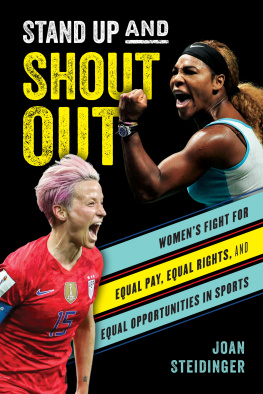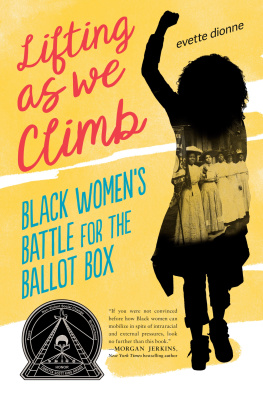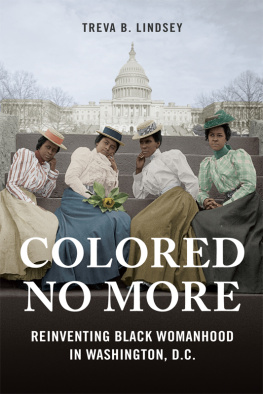This volume was published with the assistance of the Greensboro Womens Fund of the University of North Carolina Press.
Founding Contributors: Linda Arnold Carlisle, Sally Schindel Cone, Anne Faircloth, Bonnie McElveen Hunter, Linda Bullard Jennings, Janice J. Kerley (in honor of Margaret Supplee Smith), Nancy Rouzer May, and Betty Hughes Nichols.
2014 The University of North Carolina Press
All rights reserved
Set in Miller by codeMantra
Manufactured in the United States of America
The paper in this book meets the guidelines for permanence and durability of the Committee on Production Guidelines for Book Longevity of the Council on Library Resources. The University of North Carolina Press has been a member of the Green Press Initiative since 2003.
Library of Congress Cataloging-in-Publication Data
Field, Corinne T.
The struggle for equal adulthood : gender, race, age, and the fight for citizenship in the antebellum United States / Corinne T. Field.
pages cm. (Gender and American culture)
Includes bibliographical references and index.
ISBN 978-1-4696-1814-2 (pbk : alk. paper) ISBN 978-1-4696-1815-9 (ebook)
1. CitizenshipUnited StatesHistory19th century. 2. AdulthoodUnited StatesHistory19th century. 3. Equality before the lawUnited StatesHistory19th century. 4. United StatesPolitics and governmentHistory19th century. I. Title.
JK1759.F43 2014
323.097309034dc23
2014008430
18 17 16 15 14 5 4 3 2 1
Portions of this book were previously published in the following articles: Are Women... All Minors?: Womans Rights and the Politics of Aging in the Antebellum United States, Journal of Womens History 12 (2001): 11337; 2001 Journal of Womens History. Made Women of When They Are Mere Children: Mary Wollstonecrafts Critique of Eighteenth-Century Girlhood, Journal of the History of Childhood and Youth 4 (Spring 2011): 197222; 2011 by The Johns Hopkins University Press. Both used with permission from The Johns Hopkins University Press.
FIGURES
1 / Currier and Ives, Childhood, The Season of Joy
2 / Currier and Ives, Youth, The Season of Love
3 / Currier and Ives, Middle Age, The Season of Strength
4 / Currier and Ives, Old Age, The Season of Rest
5 / James Baillie, The Life and Age of Man
6 / James Baillie, The Life and Age of Woman
7 / Thomas Cole, The Voyage of Life: Childhood
8 / Thomas Cole, The Voyage of Life: Youth
9 / Thomas Cole, The Voyage of Life: Manhood
10 / Thomas Cole, The Voyage of Life: Old Age
ACKNOWLEDGMENTS
This project began at Columbia University, where I was lucky to work with Elizabeth Blackmar, who has remained the most encouraging, intellectually challenging, and insightful of colleagues over these many years. Rosalind Rosenberg, Alice Kessler-Harris, Eric Foner, and Farah Jasmine Griffin fundamentally shaped this project. Members of the Black Womens Intellectual and Cultural History Collective, organized by Farah Griffin, Barbara Savage, Martha Jones, and Mia Bay, met my ideal of a scholarly community and sustained this work.
I am most grateful for the support of the Schlesinger Library, Radcliffe Institute, Harvard University; the Virginia Foundation for the Humanities; and the Institute for Advanced Studies in Culture, University of Virginia. Working at the Schlesinger was an intellectual delight thanks to the marvelous staff, especially Diane Hamer and Ellen Shea. At the VFH, Robert Vaughan, Hilary Holladay, Paula Marie Seniors, Jerome Handler, and William Freehling, among many others, sustained this work at a crucial juncture. The vibrant community at IASCincluding James Davison Hunter, Talbot Brewer, and Murray Milnerencouraged me to consider the interdisciplinary implications of this research.
This book was vastly improved by the excellent advice of Barbara Savage and the anonymous reviewer for the University of North Carolina Press, series editors Thadious Davis and Mary Kelley, and my editor Charles Grench. I thank Paul Betz and Lucas Church for their editorial assistance and Julie Bush for her excellent copyediting. While completing this project, I began editing a book on chronological age with Nicholas Syrett. His willingness to discuss the complexities and contradictions of nineteenth-century age qualifications has greatly improved this book, as has the opportunity to read the scholarship of the contributors to that volume, especially the work of Sharon Sundue, Jon Grinspan, James Schmidt, Shane Landrum, William Graebner, Andrew Achenbaum, Timothy Cole, and Rebecca de Schweinitz.
At conferences, I received advice and insight from Matthew Gallman, Kathi Kern, Paula Fass, Patrick Ryan, Jesse Ballenger, Stephen Katz, John Gillis, Kristin Hoganson, Allison Sneider, Lisa Tetrault, Elsa Barkley Brown, Michele Mitchell, Rosemarie Zagarri, Anya Jabour, Karen Sanchez-Eppler, Leslie Paris, and Lakisha Michelle Simmons. Margaret Morganroth Gullette, Sally Schwager, Sally Roesch Wagner, Eileen Boris, and Cindy Aron generously commented on various parts of this project. Patricia Sullivan helped immeasurably. Ann Gordon clarified my understanding of Elizabeth Cady Stanton and pointed me to valuable sources. The editors and anonymous readers of the Journal of Womens History and the Journal of the History of Childhood and Youth greatly improved my argument. Becky Thomas, Jane Barnes, and Alec Hickmott provided wonderful editing.
Friends and colleagues at Columbia helped frame my ideas, especially Lara Vapnek, Francesca Morgan, Hampton Carey, Eliza Byard, Margaret Garb, Michael Sappol, and Jeffrey Sklansky. I am most grateful to Ann Lane, Paul Halliday, and Charlotte Patterson for opportunities to teach at the University of Virginia, where Denise Walsh, Jennifer Petersen, and Jennifer Rubenstein welcomed me into their writing group. Faculty in the Corcoran Department of History and the Women, Gender, Sexuality Program have encouraged my teaching and research, most especially Farzaneh Milani, Brian Balogh, Alon Confino, John Mason, Brian Owensby, Elizabeth Thompson, and Olivier Zunz, as have graduate students and undergraduates, including Willa Brown, Emily Senefeld, and Bayly Buck. Jeanne Amster, Anthony Rotundo, and Kathleen Dalton long ago inspired me to pursue this course of study.
The greatest joy of living in Charlottesville is the sustaining network of great scholars who are also great friends. Grace Hale, Lawrie Balfour, Anna Brickhouse, Bonnie Gordon, and Elizabeth Wittner are all able to talk feminist theory while running fast, uphill, in the rain. Without them and their partnersWilliam Wylie, Chad Dodson, Bruce Holsinger, Manuel Lerdau, and John PepperI never would have crossed this finish line. Sophia Rosenfeld and Matthew Affron improved my scholarship and sustained my spirit. Maurie McInnis, Martien Halvorson-Taylor, and Allison Pugh shared citations and good fun in equal measure, for which thanks also go to Dean Johnson, Neal Halvorson-Taylor, and Steve Sellers.





